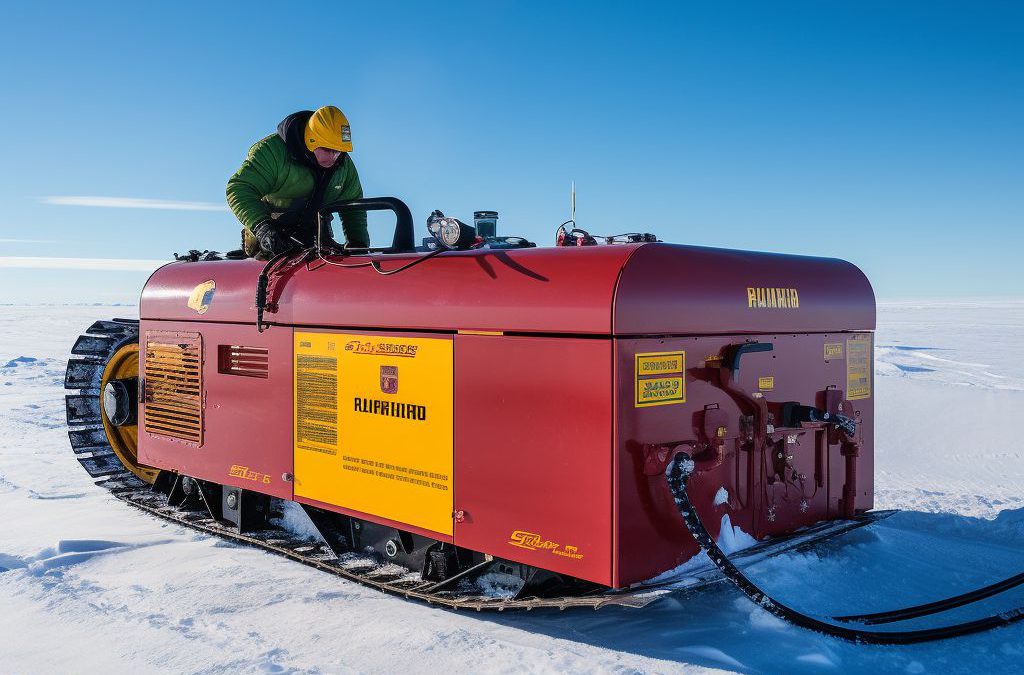As temperatures begin to plummet, the reliability of your home’s heating system becomes increasingly critical. How do you ensure the warmth of your family without pushing your energy bill through the roof? The solution lies in heat pumps, which can both heat and cool your home efficiently. However, not all heat pumps perform equally well in chilly conditions. In this article, we’ll discuss the most effective heat pumps for colder climates, so you can make an informed decision when purchasing your next HVAC system.
Tabe of Contents
- 1. Understanding the Role of Heat Pumps in Heating Homes in Cold Weather
- Which Heat Pumps Work Best in Cold Weather?
- 2. Factors to Consider Before Choosing a Heat Pump for Cold Weather Climates
- 3. Examining the Efficiency of Different Types of Heat Pumps in Cold Weather
- 4. Tips for Maintaining Heat Pumps to Improve Performance in Cold Weather Conditions
- 5. Comparing the Cost and Energy Savings of High-Performance Heat Pumps for Cold Weather Homes
- People Also Ask
- Conclusion
1. Understanding the Role of Heat Pumps in Heating Homes in Cold Weather
Which Heat Pumps Work Best in Cold Weather?
Before delving into the best heat pumps for cold weather, it’s important to understand the primary role that heat pumps play in keeping homes warm in colder climates. Heat pumps are a type of heating system that uses refrigerant to transfer heat between the indoor and outdoor environments. This process is accomplished through the use of an outdoor unit, which absorbs heat from the outdoor air, and an indoor unit that distributes that heat throughout your home.
One of the most important factors to understand about heat pumps is that they work best in moderate climates, where temperatures fall between 30-40°F. This is because heat pumps are designed to extract heat from the outdoor air and transfer it into your home. As temperatures drop below this range, the efficiency of the heat pump decreases, and it becomes less effective at heating your home.
Despite this limitation, there are still a variety of heat pumps that can work efficiently in colder climates. These heat pumps typically use advanced technology, such as variable-speed compressors, to extract heat from the air more efficiently and maintain comfortable temperatures in your home, even when outdoor temperatures drop below freezing.
2. Factors to Consider Before Choosing a Heat Pump for Cold Weather Climates
Before installing a heat pump, it is important to consider the factors that will impact its efficiency and performance in cold weather. Below are some key :
Size of the Heat Pump: The size of the heat pump should match the heating demands of your home. If the heat pump is too small, it will struggle to heat the entire home, especially in extremely cold conditions. On the other hand, if the heat pump is too large, it will cycle on and off frequently, leading to decreased efficiency and increased wear and tear on the unit.
Type of Heat Pump: There are two types of heat pumps suitable for cold weather climates – air-source and geothermal. While air-source heat pumps are relatively easier to install and less expensive, geothermal heat pumps provide better efficiency and are more suitable for extreme cold weather.
COP (Coefficient of Performance): COP is the measure of heat pump efficiency. A higher COP indicates better efficiency. When choosing a heat pump, look for models with a high COP as they will be more energy-efficient, cost-effective, and offer better performance.
Brand Reputation: Look for heat pump models from reputable brands with a proven track record of creating high-quality, reliable, and efficient units. Avoid purchasing heat pumps from unknown or unproven brands that may offer lower upfront costs but may come at the expense of reduced performance and higher maintenance costs.
Installation Location: Proper installation of the heat pump is critical for its efficiency and longevity. Ensure that the installation location is suitable and has adequate space, ventilation, and clearance around the unit for proper operation and maintenance.
By considering these key factors, you can choose a heat pump that is efficient, reliable, and suitable for your home’s heating needs in cold weather conditions.
3. Examining the Efficiency of Different Types of Heat Pumps in Cold Weather
Heat pumps are increasingly becoming popular for heating homes in cold weather climates. They work by extracting heat from the air or ground outside and transferring it inside the home to provide warmth. However, the efficiency of heat pumps can vary depending on the specific type and model being used.
Here’s an examination of the efficiency of different types of heat pumps in cold weather:
- Air source heat pumps: These are the most common type of heat pump used in cold weather climates. They work by extracting heat from the outside air and converting it into warm air to heat the home. Although they can operate in temperatures as low as -15°F, their efficiency decreases as the outside temperature drops.
- Ground source heat pumps (GSHPs): Also known as geothermal heat pumps, these are the most efficient type of heat pump for cold weather use. They work by extracting heat from the ground, which remains relatively stable even in extremely cold weather conditions. GSHPs operate with high efficiency, regardless of outdoor temperatures, and can reduce heating costs by up to 70%.
- Air-to-water heat pumps: These heat pumps use the same technology as air source heat pumps but are designed to heat water for hydronic heating systems. They’re an efficient option for cold weather climates but require a separate hot water storage tank.
It’s important to note that the efficiency of heat pumps in cold weather can be improved with proper insulation, regular maintenance, and correct sizing. Homeowners in cold weather climates should consider the efficiency of different types of heat pumps and consult with a certified professional to determine the best option for their specific needs.
4. Tips for Maintaining Heat Pumps to Improve Performance in Cold Weather Conditions
In order for heat pumps to operate efficiently in cold weather conditions, they need to be properly maintained. The following tips will help you ensure your heat pump is running at peak performance during cold weather months.
Regular Filter Maintenance
The most important part of maintaining a heat pump is regularly replacing or cleaning the air filter. A dirty filter can clog your system and cause your heat pump to work harder than it needs to, leading to increased energy bills and decreased efficiency. It’s recommended to check your filter once a month and replace it if it appears dirty.
Keep the Outdoor Unit Clear
The outdoor unit of your heat pump can become clogged with leaves, snow, and ice, hindering the unit’s performance. It’s important to regularly clear away any debris that may accumulate around the unit. If ice builds up on the unit, it can be removed by pouring warm (not hot) water over the unit to melt it away.
Schedule Professional Maintenance
Regularly scheduled professional maintenance can help keep your heat pump running at its best during cold weather months. A HVAC technician can inspect and clean the unit, as well as identify any potential issues before they become major problems. It’s recommended to have maintenance performed at least once a year to ensure optimal performance.
By following these tips, you can ensure that your heat pump is operating at peak efficiency during cold weather months. Regular maintenance and care can also help extend the lifespan of your heat pump and save you money in energy costs.
5. Comparing the Cost and Energy Savings of High-Performance Heat Pumps for Cold Weather Homes
When it comes to purchasing a heat pump, two factors that are always on homeowners’ minds are the upfront cost and energy savings that come with the unit. High-performance heat pumps may come with a higher price tag, but their efficiency can often result in significant cost savings in the long run.
One key factor to consider when comparing the cost and energy savings of heat pumps is their SEER (Seasonal Energy Efficiency Ratio) and HSPF (Heating Seasonal Performance Factor) ratings. The higher these ratings, the more efficient the heat pump is. While high-performance heat pumps may cost more upfront, they can save homeowners money over the long term through increased energy savings.
In addition, many high-performance heat pumps come with features that can further improve energy efficiency. For example, some units come with variable-speed compressors, which allow the unit to adjust its energy output based on the current demand. This feature can significantly reduce energy usage and increase efficiency. Other units may come with advanced noise-reducing technology, which can further improve the unit’s energy efficiency by reducing the strain on the system.
When comparing the cost and energy savings of high-performance heat pumps, it’s important to consider the specific needs of your home and climate. A professional HVAC technician can help advise you on the best unit for your specific needs and provide estimated energy cost savings based on your current heating system. Ultimately, investing in a high-performance heat pump can provide long-term cost savings while also reducing your carbon footprint and impact on the environment.
People Also Ask
Can heat pumps work in extreme cold weather?
Yes, heat pumps can work in extreme cold weather but models with a higher heating capacity work best. Manufacturers have developed models that can operate in temperatures as low as -15°F and even -25°F.
What type of heat pump works best in colder climates?
Ductless mini-split heat pumps work best in colder climates. These systems have an air-handling unit installed indoors and a heat pump installed outside. They can provide efficient heating in temperatures as low as -13°F.
Do geothermal heat pumps work well in cold climates?
Yes, geothermal heat pumps can work well in cold climates. They use the constant temperature of the earth to heat and cool homes. Unlike air-source heat pumps, geothermal systems aren’t affected by changes in outdoor air temperatures, so they can provide reliable heating even in cold climates.
Are there any downsides to using a heat pump in cold weather?
One downside to using a heat pump in cold weather is that the system may lose efficiency as the temperature drops. This can lead to higher energy bills. Additionally, some heat pump models may struggle to provide adequate heating in extreme cold weather.
What should I look for when choosing a heat pump for cold climates?
When choosing a heat pump for cold climates, look for models with a high heating capacity and a low HSPF (heating season performance factor) rating. You should also consider the size of your home and the local temperature range to ensure that the heat pump you choose can provide adequate heating during the coldest months of the year.
Conclusion
Heat pumps can work in cold weather, but choosing the right system is crucial to ensure optimal performance. Ductless mini-split heat pumps and geothermal heat pumps are generally the best options for colder climates. When choosing a heat pump, consider the system’s heating capacity, HSPF rating, and the temperature range in your area. By selecting a system that meets your needs, you can enjoy efficient and reliable heating even in extreme cold weather.

Senior HVAC Technician
With over 15 years in the HVAC industry, Lucas specializes in diagnosing intricate AC system issues. His commitment to precision and thoroughness ensures every repair restores optimal functionality to your cooling systems.

